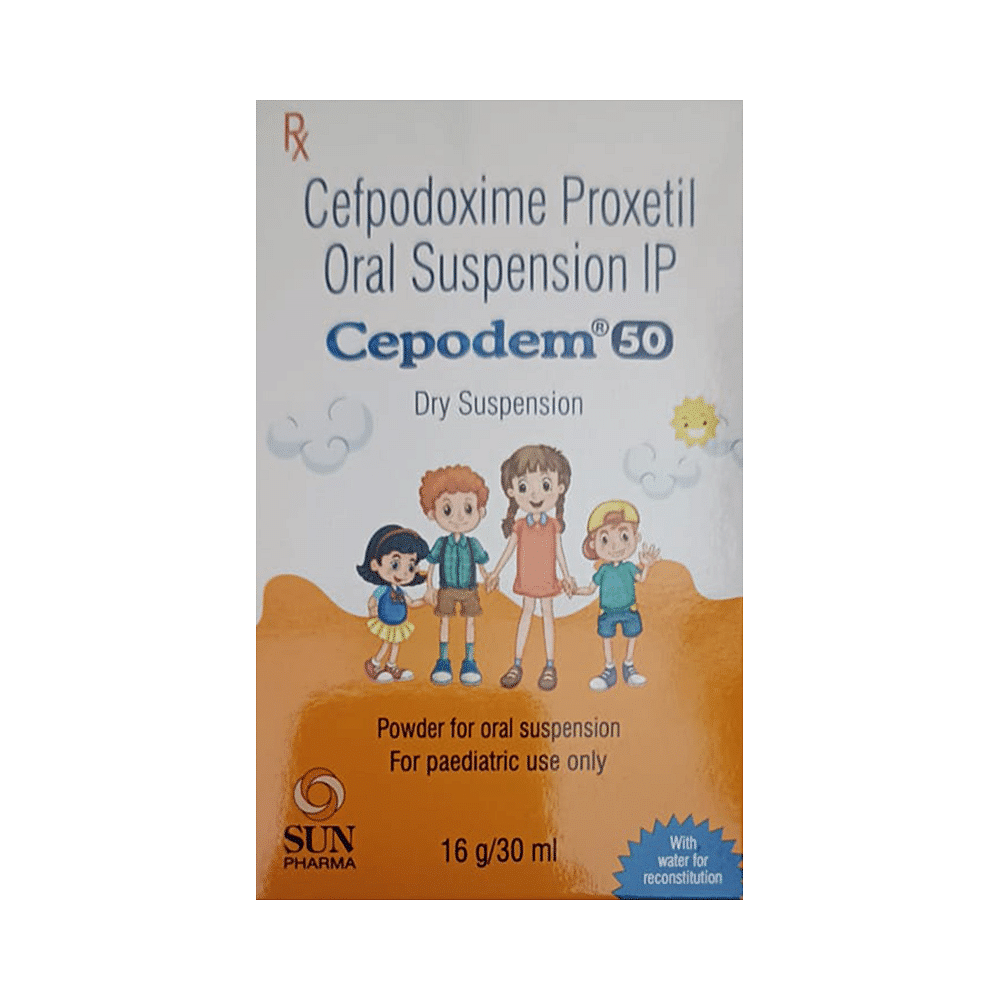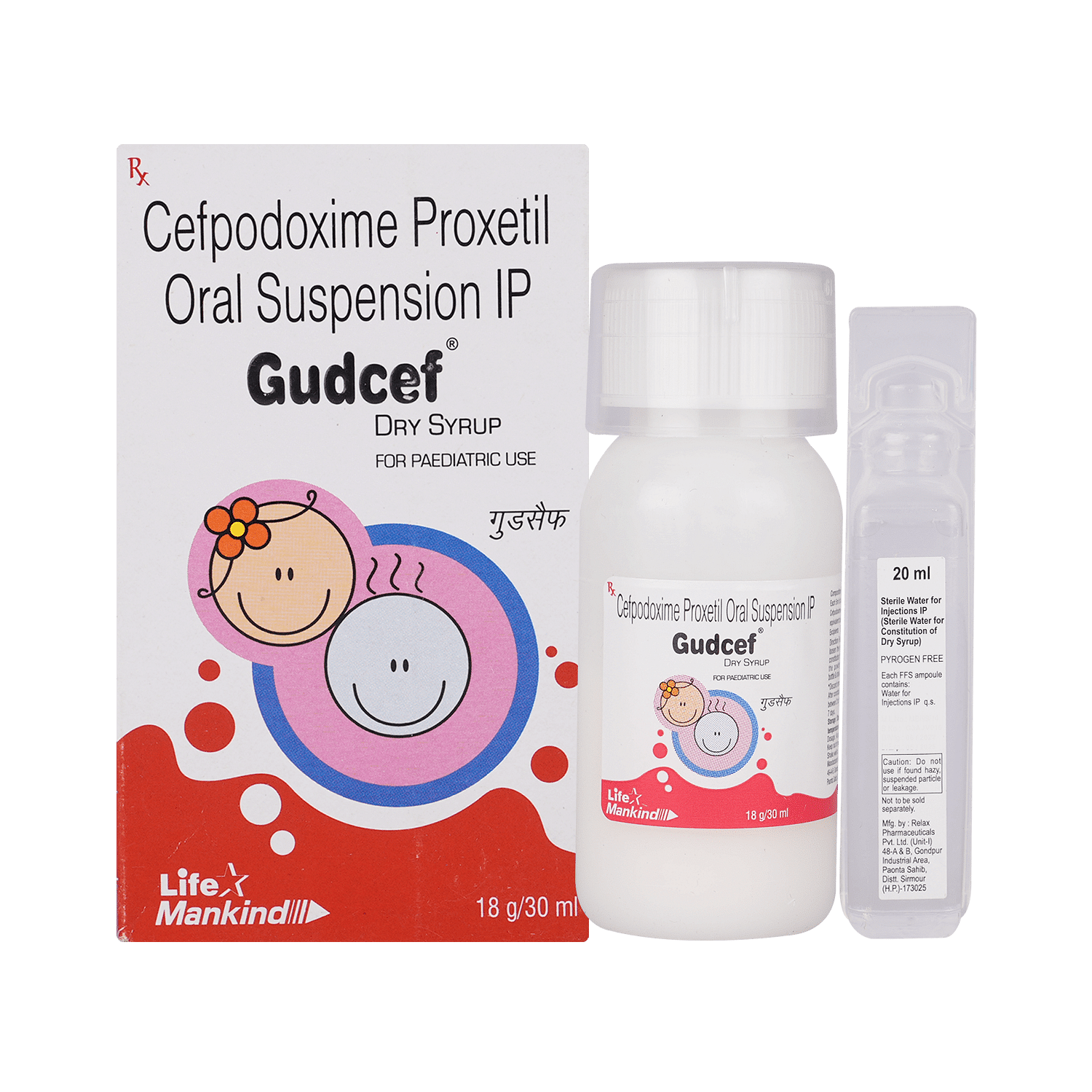
Rapodox Dry Syrup
Manufacturer
Rapidchem Healthcare
Salt Composition
Cefpodoxime Proxetil (50mg)
Key Information
Short Description
Rapodox Dry Syrup is an antibiotic medicine used to treat a wide range of bacterial infections in children, including ear, eye, nose, throat, lung, skin, gastrointestinal tract, and urinary tract infections, as well as typhoid fever.
Dosage Form
Oral Suspension
Introduction
Rapodox Dry Syrup is an antibiotic medicine commonly given to children for the treatment of a wide range of bacterial infections. It is effective in treating infections targeting the ears, eyes, nose, throat, lungs, skin, gastrointestinal tract, and urinary tract. It is also used to treat typhoid fever in children and adolescents.
Directions for Use
Give this medicine with food to avoid an upset stomach. Encourage your child to drink plenty of water in case diarrhea develops as a side effect.
How it works
Rapodox Dry Syrup is an antibiotic that works by preventing the formation of the bacterial protective covering (cell wall) which is essential for the survival of the bacteria. This medicine stops the infection-causing bacteria from growing further and prevents the infection from spreading without making the bacteria resistant to further treatment.
Quick Tips
Your child must complete the entire course of antibiotics. Stopping too soon may cause the bacteria to multiply again or become resistant or cause another infection. Give this medicine with food to avoid an upset stomach. Encourage your child to drink plenty of water in case diarrhea develops as a side effect. Conditions like common cold and flu are caused by viruses. Never use this medicine for such conditions. Only give Rapodox Dry Syrup to your child for their current infection. Never save medicine for future illnesses.
Related Medicines

Cepodem 50 Dry Suspension

Gudcef Dry Syrup

Jadupox Dry Syrup

Veedoxime 50 Dry Suspension

Grandcef 50 Oral Suspension

Cefodox 50mg Oral Suspension

Drapod 50 Oral Suspension

Expod 50 Dry Syrup

Jespodime 50 Dry Syrup

Cefokan 50 Dry Syrup
Frequently asked questions
What if I give too much of Rapodox Dry Syrup by mistake?
Giving your child more than the recommended dose of Rapodox Dry Syrup is unlikely to cause harm, but it's essential to seek immediate medical attention. Contact a doctor or visit an emergency room as directed by the product label for guidance on managing such situations.
Are there any possible serious side effects of Rapodox Dry Syrup?
Some potential side effects include severe vomiting, kidney damage, allergic reactions, diarrhea, and severe gastrointestinal infections. It's crucial to consult with your child’s doctor if you notice any unusual symptoms.
Can other medicines be given at the same time as Rapodox Dry Syrup?
It is essential to inform your child's healthcare provider about any other medications or substances being used before starting Rapodox Dry Syrup. Additionally, always consult with a healthcare professional before administering any new medication to your child.
Can I get my child vaccinated while on treatment with Rapodox Dry Syrup?
Antibiotics are unlikely to interfere with the ingredients in vaccines or cause adverse reactions in children. However, it is recommended to wait for your child’s recovery before administering any vaccinations after a course of antibiotics.
Which lab tests may my child undergo while taking Rapodox Dry Syrup on a long-term basis?
Based on the severity and duration of your child's condition, the doctor may recommend periodic kidney function or liver function tests. This helps monitor any potential side effects.
The mucus coming out of my child’s nose is yellow-green. Is it a sign of a bacterial infection?
Yellow or green mucus in the nose is not necessarily indicative of a bacterial infection and does not require immediate treatment with antibiotics. During common colds, mucus may thicken and change color. Symptoms often resolve within 7-10 days.
My child is having a sore throat and ear infection. Can I give antibiotics?
No. Antibiotics are ineffective for viral infections like sore throats and ear infections. If your child presents with symptoms such as sore throat, runny nose, a barky cough, pain, and discharge from the ear, it’s likely caused by a virus. Consult your child’s doctor to determine appropriate treatment.
Does a common cold caused by viruses always result in a secondary bacterial infection? When to start an antibiotic to prevent infection?
In the majority of cases, bacterial infections don't follow viral infections. Using antibiotics for viral infections can be detrimental and lead to side effects without providing any benefit to your child’s health. Consult with your child's healthcare provider before starting antibiotics.
Can Rapodox Dry Syrup impact my child’s digestive system?
Antibiotics can disrupt the gut microbiome, potentially causing digestive issues like diarrhea in children. This is often a result of killing off both good and bad bacteria. If your child experiences diarrhea while on Rapodox Dry Syrup, don't stop the course without consulting their doctor. They may adjust the dosage to alleviate symptoms.
Can Rapodox Dry Syrup lead to bacterial resistance in my child?
Yes, improper antibiotic use or misuse can contribute to bacterial resistance. This means that bacteria become resistant to the effects of antibiotics, making infections more difficult to treat.


